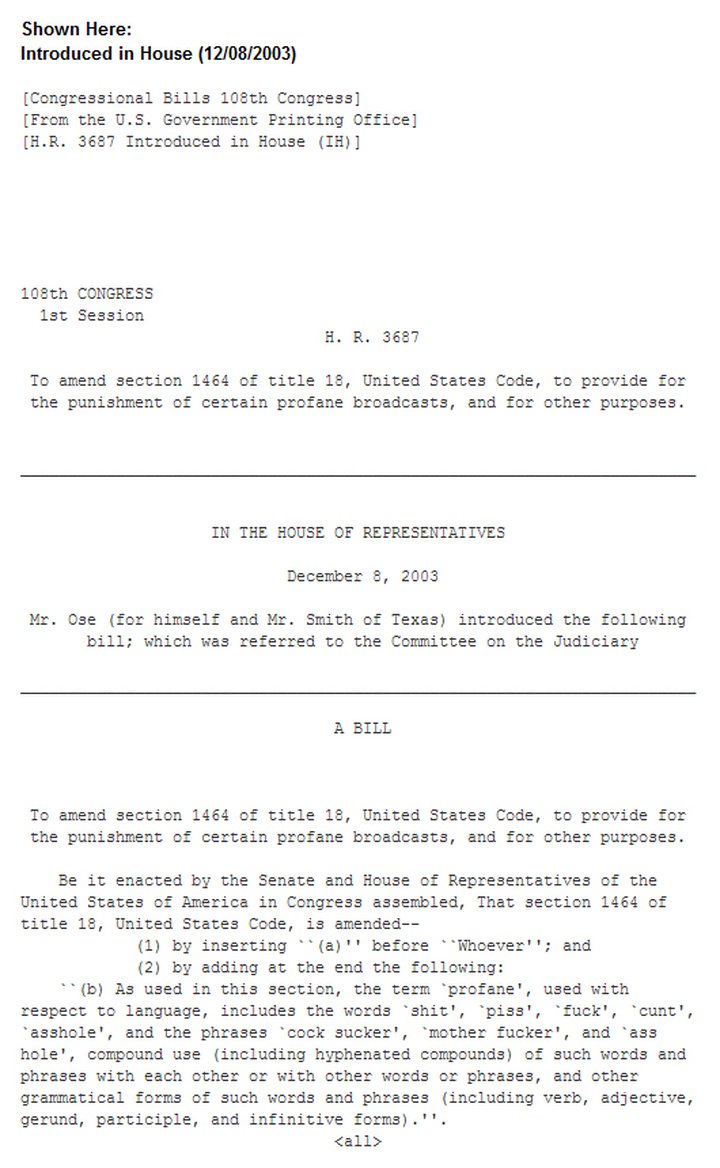“When used judiciously, swearing can be hilarious, poignant, and uncannily descriptive…it recruits our expressive faculties to the fullest: the combinatorial power of syntax; the evocativeness of metaphor; the pleasure of alliteration, meter, and rhyme…”
– Steven Pinker, linguist
###
So here’s Bono, 2003 Golden Globes ceremony, accepting the award for the Best Original Song in a Motion Picture on behalf of his group U2 for The Hands that Built America featured in Gangs of New York. He’s obviously excited as all get-up: “This is really, really fucking brilliant!” he enthused as he ran up to the microphone. NBC, which was broadcasting in real time (no delay), was swamped with complaints, leading to conservatives asking the FCC to impose a stiff fine on the broadcaster.
Which—surprisingly—it didn’t, noting that Bono’s “fucking” didn’t come under its guidelines for indecency, “material that describes or depicts sexual or excretory organs or activities.” Government to the rescue! California Representative Doug Ose introduced, arguably, Washington’s most obscene bill, HR 3687, aka the Clean Airwaves Act, which would have forbade from broadcast:
the words “shit”, “piss”, “fuck”, “cunt”, “asshole”, and the phrases “cock sucker”, “mother fucker”, and “ass hole”, compound use (including hyphenated compounds) of such words and phrases with each other or with other words or phrases, and other grammatical forms of such words and phrases (including verb, adjective, gerund, participle, and infinitive forms).

It’s fun to analyze Ose’s bill, which, fortunately for the sanity of the nation, died in committee. Had this bill been read aloud over the air, it presumably would have become a victim of its own language! Ironically, the act wouldn’t have applied to Bono’s “fucking brilliant,” since in conventional English grammar, only adverbs can modify adjectives (“eerily quiet,” “blindingly obvious”). Formally, “fucking” here is an adverb in that it modifies “brilliant”—and adverbs get a pass, according to HR 3687.
(To be pedantic, Bono’s “fucking” probably isn’t a true adverb—someone pointed out that you can imagine a conversation that went, “How brilliant was it?” “Very!” but not, “How brilliant was it” “Fucking!” So it’s probably best to just call his “fucking” an expletive and be done with it.)
In any case, what’s the problem here? I guess the idea is that kids will hear these “obscene” words and consequently be corrupted for life. As if they don’t hear them every day; as a friend explained long ago, “I say ‘fuck’ because it makes me feel powerful.” So it is with kids—they’re not going to pass on this easy way to appear cool in front of their peers. And isn’t it weird that four-letter words are obscene, yet the depiction of violence on TV—the same networks targeted by Ose’s bill—is OK? So how did it come about that fuck, cunt and all the rest set off our emotions so powerfully? (Even “shit”! The New York Times refers to philosopher Harry Frankfurt’s best-seller as “On Bull****”.)

Linguist Steven Pinker attributes our deep-seated response to swear words to their origin in (wouldn’t you know it) religion: “Thou shalt not take the name of the Lord thy God in vain,” per the Third Commandment. So when our ancestors cursed with “Jesus Christ!” or “goddammit” or “dammit all to hell” or “Holy Mary” or “God strike me dead,” they were blaspheming (from Greek blasphemein = to speak evil of), meaning they were literally incurring the wrath of God. Over the years, however, when people noticed that blaspheming didn’t bring dire consequences, bodily parts and actions took over as religious curses lost their power. (Although we still swear on a Bible in court, “as if an act of perjury undetected by the legal system would be punished by an eavesdropping and easily offended God,” as Pinker puts it.)
Why? What’s so terrible about the four-letter words we now use? Because, according to linguists, they bring to mind scary and/or fatal outcomes. For instance, feces can transmit cholera, hepatitis A and E, and a host of other diseases; and in addition to pleasure, intercourse can bring a whole realm of terrors such as STDs and AIDS, unwanted pregnancies, the break-up of marriages (along with the fact that sex isn’t always between consenting adults). Especially disease: according to Wikipedia, more than 20% of individuals in the range of 15–34 years old in late 18th century London were treated for syphilis—hence the curse “A pox on thee!”
So we went from cursing our enemies with the wrath of God to cursing them with the threat of disease and more. (Begging the question, if you tell me to “go fuck myself,” what exactly are you requiring of a non-contortionist like me, I wonder?)
Well golly-gee Jehosaphat, we’ve sure come a long way from when Rhett challenged the mores of the day (1939) on the silver screen when he blew off Scarlett with the risqué, “Frankly, my dear, I don’t give a damn.”
CLICK TO MANAGE